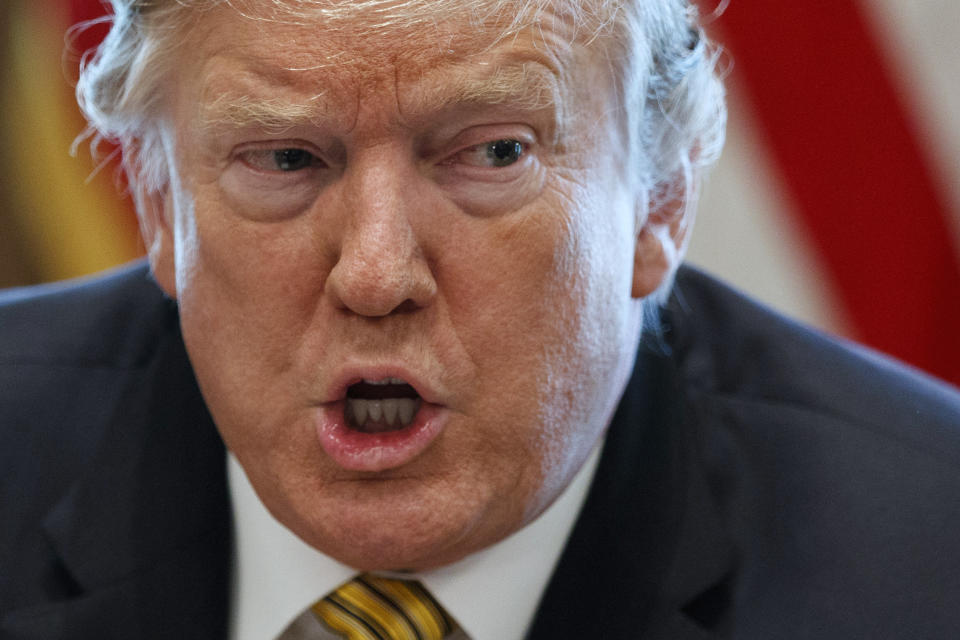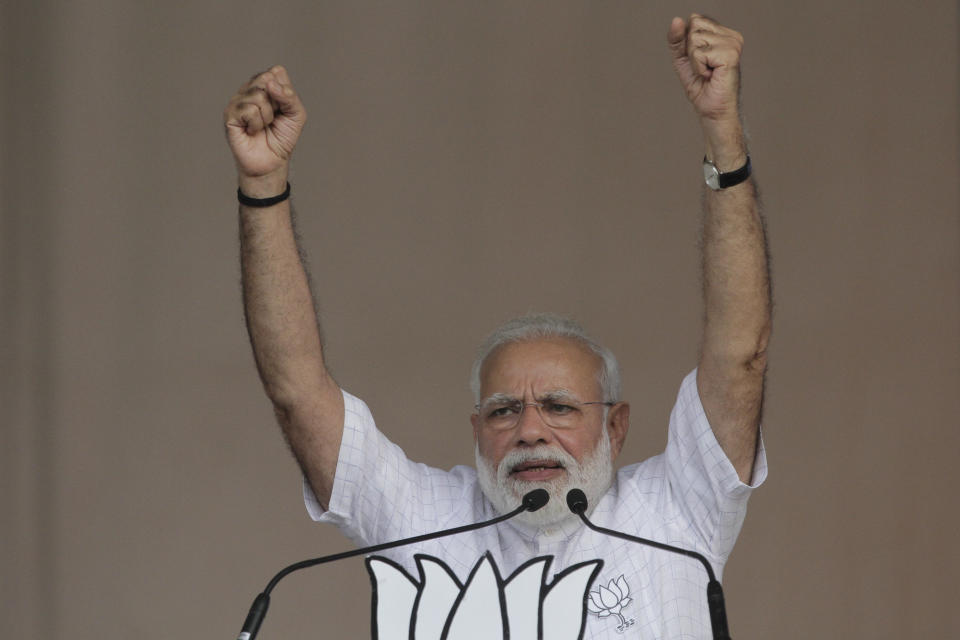Trump is 2nd most liked current world leader on Facebook

A new study of how effectively world leaders use Facebook (FB) says President Trump is the second-best in the world: Brazil's president Jair Bolsonaro’s page gets more interactions, while Indian prime minister Narendra Modi’s page has more likes.
The fourth edition of World Leaders on Facebook, produced by the Twiplomacy practice of the public-relations firm Burson Cohn & Wolfe, downgrades Trump from his first-place rank in last year’s survey.
“Brazil’s new President Jair Bolsonaro, who took office on January 1, 2019, has dominated the rankings of World Leaders on Facebook over the past 12 months and has taken the top spot from U.S. President Donald Trump,” the report reads.
It credits his page, with an audience of 9.4 million fans, for earning more than 145 million interactions—defined as “the sum of likes, comments and shares”--versus 84 million interactions for Trump.
Looking at audience size alone, Trump’s audience of 24 million remains second after India's Modi, who’s had roughly 44 million people like his page.
The report weighed interactions more heavily in grading the Facebook presences of 182 countries’ governments and leaders, which combined to collect more than 345 million page likes and 767 million interactions from March 1, 2018 to March 1 of this year.
But as the rest of this document makes clear, the success of Trump and Bolsonaro may not be replicable—nor is there any one right way to market on Facebook. The government social-media managers this report quotes extensively could only agree on one thing: Facebook’s workings remain frustratingly opaque.
An unpredictable Facebook leaderboard
The raw audience numbers of the report—based on data gathered using BCW’s analytical tools and those of Facebook’s CrowdTangle—shows how a total of Facebook likes doesn’t need to match any larger pattern.
It’s not a huge surprise that the government leader with the biggest audience, Modi, leads the world’s largest democracy. But the 17 million people like the page of the third-ranked leader by audience, Queen Rania Al Abdullah of Jordan, far exceed that country’s population.
None of the leaders profiled in this report touch the audience of Barack Obama’s page, which has almost 55 million Likes. Trump’s predecessor, in turn, falls well behind the world’s most famous athletes (Portuguese soccer great Cristiano Ronaldo has 122 million) and entertainers (Taylor Swift and her 72 million).
Trump’s declared Democratic opponents in 2020 have far smaller audiences at their campaign pages, topped by Sen. Bernie Sanders (I-Vt.), with 5.1 million likes; Sen. Elizabeth Warren (D.-Mass.), with 3.2 million; Sen. Cory Booker (D.-N.J.), at 1.2 million; and Sen. Kamala Harris (D.-Calif.), with 1.1 million.
If you were about to ask about Rep. Alexandria Ocasio-Cortez (D.-N.Y.), her mastery of Twitter (TWTR) and Instagram hasn’t been matched on Facebook, where her page has drawn a relatively paltry 731,000 likes.

Individual Facebook posts spotlighted in the report also fail to fit any pattern. An image of the “Dear Madame Speaker…” letter Trump sent to House Speaker Nancy Pelosi (D.-Calif.) in January canceling her planned trip to Afghanistan during the partial government shutdown got a record 935,524 interactions.
But that doesn’t mean that conflict sells. The most-viewed video in the study was Canadian prime minister Justin Trudeau’s Ramadan greeting to Muslims last year, which drew 10 million views and 834,605 interactions.
Social-media tactics
What tactics should you try if you want to market your country—or your company or yourself—on Facebook? The only clear takeaway is the report’s echo of Facebook’s own endorsements of video.
“Native Facebook videos represent 16 percent of all the posts but generate 26 percent of all interactions,” the report says. “A Facebook video garners, on average, 2,867 interactions and live videos have the best engagement with an average of 6,082 interactions per broadcast.”
The most-viewed Facebook Live spot came from Bolsonaro—a 20-minute broadcast from a hospital bed after a Sept. 2018 assassination attempt.
Facebook constantly recommends promoting posts with ads, but BCW’s report found no purchased promotions by Bolsonaro. That’s a massive contrast to Trump, whose page has run more than 50,000 ads and features several different ones each day.
Connecting with constituents via Facebook Messenger chatbots seems optional. The report approvingly cites Singapore’s use of bots but does not note that Trump quickly shut down the bot created by the Obama White House.
This study by BCW, a subsidiary of the British marketing firm WPP plc (WPP), doesn’t cover disinformation campaigns by Russia and others—although it does include a cheery essay by the Russian Foreign Ministry’s Sergey Nalobin that ends “We’ll see you online!”
Twiplomacy managing director Matthias Lüfkens explained in an email that the report only focuses on “heads of state, governments and foreign ministries”—not intelligence agencies or other unconventional influence operations.
Even heads of state struggle with the News Feed
This study notes that Facebook’s changes in the News Feed algorithm have made life harder overall for governments—for instance, Trump’s likes only grew by 3% in the last year.
The government social-media directors whose essays fill out the last section of the report express a bit of a serf’s mentality: We don’t know how to make Facebook work well for us, but we can’t leave it either.
In a typical comment, European Union social manager Paolo Ganino comments that “trial and error has helped us realise that there is little we can do to get around the restrictions set by the algorithm.”
Rasmus Eljanskog, with Sweden’s Ministry for Foreign Affairs, phrased the same thought more colorfully.
“‘How do we get more likes on our Facebook posts?’,” he wrote. “If I had a krona for every time I’d been asked that question by our foreign missions, the International Space Station would have to adjust its orbit to dodge a copper‐plated tower every time it floated past Stockholm.”
Same here, Rasmus. Same.
Email Rob at rob@robpegoraro.com; follow him on Twitter at @robpegoraro.

 Yahoo Finance
Yahoo Finance 
